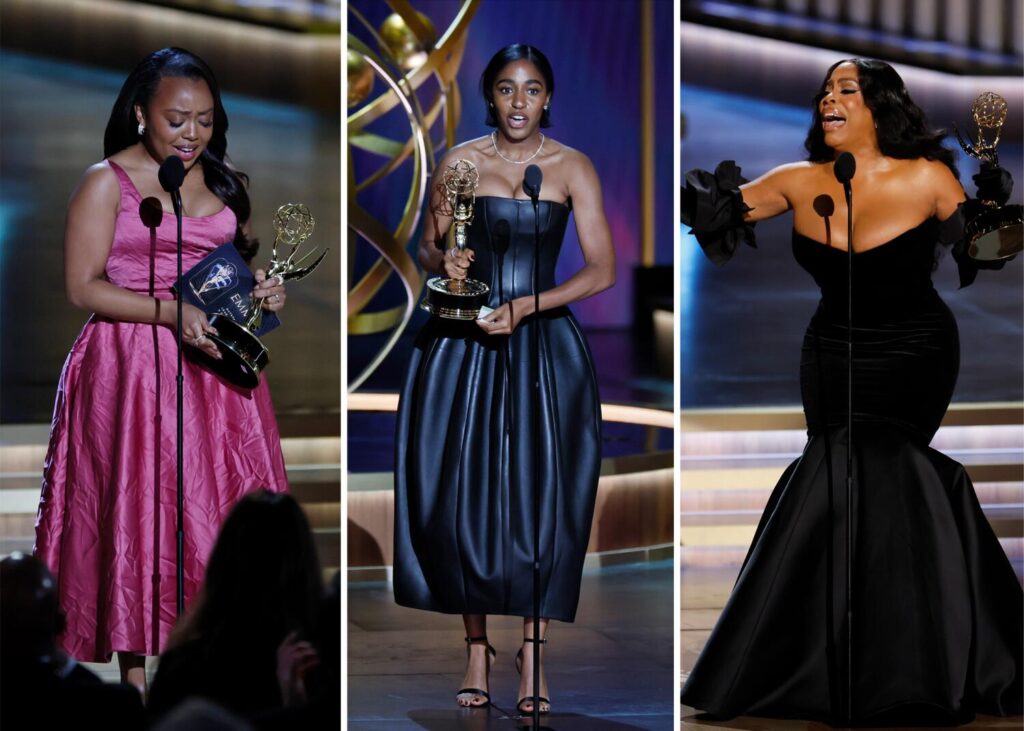After a brief surge in performers of color winning Emmys, the awards had fallen back into old habits — until Monday night’s ceremony, which handed out 12 of this year’s prizes to performers of color.
In 2020, Black performers earned a record seven wins for acting in drama, comedy and limited series categories. That year, which included the roiling summer of George Floyd protests, saw a massive jump from previous years in terms of Emmy nominations for Black performers. For the five years prior to 2020, 14% of the nominees in comedy, drama and limited series acting categories were Black. In 2020, 33% were — crowned by the record-setting number of winners.
But was it just a blip? In 2021, a year dominated by mostly white-cast shows such as “The Crown” (recording a historic sweep), “Ted Lasso,” “The Queen’s Gambit” and “Hacks,” Black performers collected only guest prizes (Courtney B. Vance in the already canceled “Lovecraft Country” and Maya Rudolph and Dave Chappelle for “Saturday Night Live”).
The next year, 2022, saw records for winners of Asian descent shattered thanks to “Squid Game,” with historic triumphs in many categories, including for lead actor in a drama (Lee Jung-jae) and guest actress in a drama (Lee You-mi). Black performers scored guest actor in a drama (Colman Domingo for “Euphoria”) and lead actress in a drama (Zendaya, repeating for “Euphoria”).
The 2023 Emmys (handed out in January 2024 because of the actors’ and writers’ strikes last year) saw diversity bounce back with a vengeance.
This year saw five Black winners in comedy, drama and limited series categories, one more in short form, and four more for non-acting/non-on-camera performances, including one for a certain former president.
Add in the two Asian American winners for lead acting in a limited series, and that’s 12 performers of color collecting trophies tonight and at the Creative Arts Emmys last week.
At the Creative Arts Emmys, the winners included Sam Richardson (guest actor in a comedy for “Ted Lasso”), Jasmine Guy (actress, short form comedy or drama series for “Chronicles of Jessica Wu”), Storm Reid (guest actress in a drama series for “The Last of Us”), RuPaul (reality or competition host for “RuPaul’s Drag Race,” his 14th win), Keke Palmer (a historic win as game show host for “Password”), Maya Rudolph (character voice-over performance on “Big Mouth”; her fifth Emmy) and former president Barack Obama (narrator for “Working: What We Do All Day”; his second narration Emmy).
On the Primetime Emmy stage Monday, Niecy Nash-Betts won for her supporting work on the limited series “Dahmer — Monster: The Jeffrey Dahmer Story,” Ayo Edebiri for her supporting work on the comedy series “The Bear” and Quinta Brunson for leading the comedy series she created, “Abbott Elementary.”
Additionally, Ali Wong (the first actress of Asian ancestry to win a lead acting Emmy) and Steven Yeun won as the leads of “Beef,” adding to the show’s domination of the limited series categories. It collected three other trophies, including prizes for limited series, directing and writing (making writer-director-creator Lee Sung Jin a triple winner and actor-producer Yeun a double winner), driving its total haul to eight.
The sample size from 2020 to now isn’t large enough to be taken seriously by any statistician, but just as no one year should be cause for panic, condemnation or any firm positive conclusions, one more year of diverse winners might be a sign of where the Emmys are headed.

